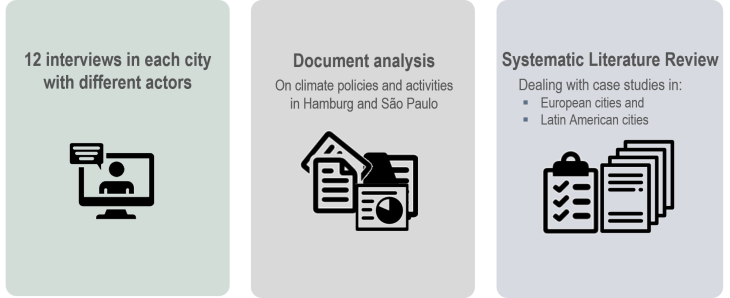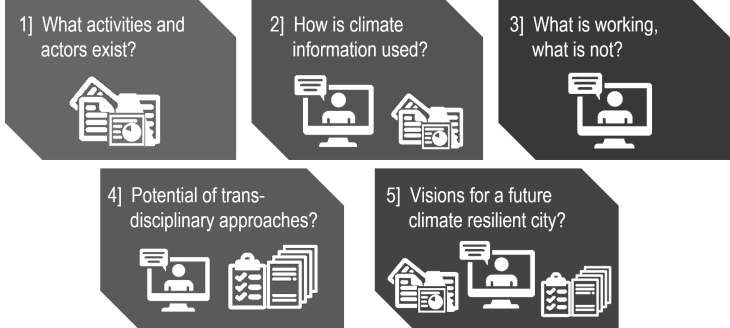Final iSPECS Workshop on project results
A final iSPECS workshop was organised aiming at bringing interviewed stakeholders and other (including academic) stakeholders from Hamburg and São Paulo together in order to present and discuss the main findings from the project.
The workshop took place virtually with ten participants from each city and lasted 2,5h. The workshop helped to validate and contextualise project findings on the one hand, and aimed at opening a space for discussing and learning across the two case studies on the other hand. Exchanging and learning from other experiences may stimulate new ideas for activities and networking.
Presentation of findings along five major issues
We presented the findings from the stakeholder mapping, the case study analysis, the interviews and a systematic literature review on institutional and sociocultural factors that affect the science-policy interface and uptake of climate information in urban climate governance in European and Latin American cities. In the workshop, we aimed to explore differences and similarities for the Hamburg and São Paulo case, which were then discussed with the participants along guiding questions in breakout groups. We organised our findings and the following discussion along five aspects:
- For both cities, we identified a long history of climate policies and a rich stakeholder landscape engaged in climate-related activities, including relevant knowledge institutions. Despite this rich institutional setting, we found only weak institutionalised linkages between science/knowledge-production and policy-making.
- With regard to the use of climate information in urban decision-making, we found for both cases that the availability of data or missing expertise is not a major challenge. However, the use of climate information in the multi-level governance system remains unsystematic and little coordinated. The engagement with climate information beyond obligatory work procedures in the administration is inhibited by a structural lack of resources.
- We find in both cities very similar drivers and barriers for the realisation of climate action, which are likewise reflected in the literature (resources, political will, silo-mentality etc.). For São Paulo, the participation in international networks (C40, ICLEI) was highlighted as important driver, while for Hamburg the Fridays for Future movement was emphasized.
- Approaches like transdisciplinary projects and living labs are gaining importance in the literature and have also been realised in Hamburg, and to a smaller extent in São Paulo. While procedural benefits such as networking and mutual learning have been highlighted for these approaches, the time intensive, but only punctual intervention was discussed critically.
- A missing courage to fulfil the cities’ visions of becoming a climate forerunner has been criticized in both cases. Demands for going beyond mere technical solution towards socioecological transformation processes can be found in our cases and in the literature.

Figure: iSPECS Methods presented at the workshop

Figure: iSPECS results were discussed along five major issues, combing findings obtained from the different methods

